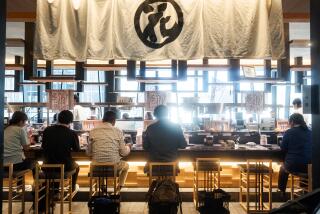Fine Classical Comedy by Nomura’s Troupe
- Share via
In their efforts to demystify the Japanese classical comedic theater Kyogen, the Japanese American Cultural & Community Center went oddly overboard, but this didn’t detract from the fine performances given by Mansaku Nomura’s Kyogen Theater Company at the Japan America Theatre on Friday.
Kyogen wasn’t always considered high culture. Originally performed for the ruling samurai class between the more stately, austere Noh dramas, Kyogen’s stature has only risen in this century. As with the more well-known Kabuki, all the roles are performed by men.
Mansaku Nomura, designated a Living National Treasure in Japan, has been active in popularizing this art form by teaching at American colleges and performing internationally.
Still, acknowledging the language and cultural barriers, Japanese theatrical groups generally perform bills that are easily accessible to audiences. Usually, this means spectacular tales of the supernatural and family-centered stories. Friday night was no exception.
The first story, “Funa Watashi Muko” (The Groom in the Boat), was about a mischievous boatman known for his glorious beard. This is something slightly more meaningful to Japanese men, who more often worry about a five-month shadow than a five o’clock one.
A dutiful young groom (Mansai Nomura, Mansaku’s son) is making his first ceremonial visit to his in-laws, carrying gifts of sake and fish. He boards a raft guided by a thirsty bearded man (Mansaku Nomura), who extorts the wine from the chagrined groom. When the boatman returns home, he discovers that the young groom is his son-in-law. The boatman’s wife (Mannosuke Nomura, Mansaku’s younger brother) persuades him to shave off the beard so the groom won’t recognize him.
The handsome Mansai was funny as a good-natured man straining for dignity beyond his years, while Mansaku moved easily from the shrewd, bold boatman to the panicked father-in-law.
Predictably enough, the second play, “Kubi-hiki” (Neck-pulling), was a demon story, one more charming than frightful. You know the demons from the humans because the demons have masks and unruly manes of bad hair.
A great warrior, Tametomo (Mannosuke Nomura), meets with a terrifying orange-haired demon (Mansai Nomura). Luckily for our hero, the demon is training his black-haired daughter (Yukio Ishida) the rudiments of eating humans. This prissy, flighty girl demon, clad in a pastel pink kimono, is both frightened by and attracted to Tametomo. Tametomo asks for a chance to compete for his life with the demon girl in tests of physical strength. The last test is neck-pulling.
Ishida’s high-pitched girlish titter and skipping gait, with hands shyly hidden in the kimono sleeves, are hysterical. Mansai shifts comically from a commanding, frightful demon to a concerned but prodding demon father who chides Mannosuke’s stolid warrior to be kinder to his daughter.
The programs included both a synopsis and a complete English script, and this, along with the expressive voices, faces and gestures of the actors, made the story line easy enough to follow.
Yet concerned that everything be understood, the Japan America Theatre left the audience a bit confused. The bill opened with an empty stage and a disembodied voice explaining basically all that was already in the program notes. The same disembodied voice later announced the show’s end, but some did not hear the announcement and politely remained in their seats until matters became more clear.
More to Read
The biggest entertainment stories
Get our big stories about Hollywood, film, television, music, arts, culture and more right in your inbox as soon as they publish.
You may occasionally receive promotional content from the Los Angeles Times.










